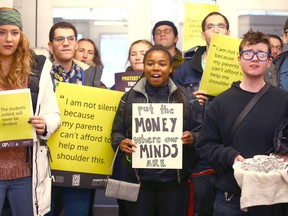U of C approves tuition fee hike, putting blame on government cuts

Article content
Most University of Calgary students will have to pay hundreds of dollars more for tuition in the coming academic year after the school’s board of governors approved hikes of up to 15 per cent on Friday.
The decision came as more than 50 undergraduate and graduate students gathered outside the meeting to protest on Friday morning, chanting “student hikes have got to go” and “students united will never be defeated.”
Most members of the public were not able to attend the meeting. Public attendance, including for news media representatives, was capped at 17 people by the board of governors.
For undergraduate students, the increased costs will mean the largest burden is borne by engineering students. Both domestic and international students in undergraduate engineering programs will face 10 per cent fee hikes.
Master of engineering students, along with master of business administration and master of public policy students from Canada, will all face 10 per cent fee increases, while international students in those graduate programs will pay 15 per cent more next school year.
All other current undergraduate and graduate U of C students will see a five per cent tuition hike in 2020-21. That translates to about $316 in extra costs for an undergraduate student in an arts and science program, said Dru Marshall, provost and vice-president (academic).

All graduate students in nursing, data science and social work programs will pay two per cent more this coming school year.
Marshall said there was “a significant number of students who are in favour of the increase.”
“We have 34,000 students on our campus and I think we have 34,000 versions of what they might think about this tuition increase,” Marshall said.
“We’ve received a lot of feedback from students who are OK with the tuition increase, but you certainly heard a vocal minority today and what I would say is these were very carefully considered. We worked very closely with student leaders.”
New students, meanwhile, will generally face higher tuition increases than those currently enrolled in programs at the university.
Canadian students entering the school will pay seven per cent more than they would have prior to the fee hike, while new international students will face a 10 per cent tuition increase.
Marshall said the board’s decision means tuition increases will range from around $80 to $2,000 per student, depending on their program, level and status.
Student leaders at the undergraduate and graduate levels had been asking the board to tie any potential tuition increases to consumer price index levels, essentially keeping prices in line with inflation.
“A five per cent increase would impose extra financial stress on graduate students which are already under the poverty line,” said Mohamed Abdelsamie, vice-president (academic) of the Graduate Students’ Association.
“This will affect their productivity, will affect their mental health. Some students cannot continue their programs because they have already budgeted for the whole program.”
Sadiya Nazir, vice-president (external) of the University of Calgary Students’ Union, which represents undergrads, said decision-makers seemingly ignored student leaders’ feedback at town halls and meetings with university administration.
“There are students who will be disproportionately affected,” said Nazir.
“We need to have students at the table helping guide consultation and helping facilitate the student voice being implemented into any proposals. What we have seen is a lack of meaningful consultation with the university.”
Marshall said the university held 19 consultation meetings with students prior to the board’s decision. She said 15 per cent of revenue generated from the tuition increase, or around $1.5 million, would go toward financial aid to help students disproportionately affected by the higher costs.
The increased costs come after the UCP government lifted the post-secondary tuition freeze, imposed by the former NDP government, in its October budget.
“The five-year government-mandated tuition freeze means that tuition at the University of Calgary has not kept pace with its Canadian peer universities, creating a substantial gap between the University of Calgary tuition and its peer group,” said Geeta Sankappanavar, chair of the U of C’s board of governors.
“The university has been and will continue to explore all the levers at its disposal on both the revenue and cost sides to develop a balanced budget.”

The UCP budget, which cut post-secondary funding by 12.5 per cent over the next three years, left the U of C facing a $32.9-million deficit. In November, the school began its first round of layoffs, eliminating 250 positions.
Sankappanavar declined to disclose the breakdown of the 21-member board’s vote, but said a significant majority was in favour of the proposal that raised fees.
Under the provincial government’s new tuition regulation framework, Alberta universities are able to increase tuition for domestic students by rates of up to seven per cent over the next three years, and if required, up to 10 per cent in certain programs.
Marshall said the university made use of that clause for its engineering programs, for which tuition had been around 30 per cent below the national average.
She said other students could expect tuition increases of about seven per cent, the provincial maximum, in the coming years.
shudes@postmedia.com
Twitter: @SammyHudes









Postmedia is committed to maintaining a lively but civil forum for discussion. Please keep comments relevant and respectful. Comments may take up to an hour to appear on the site. You will receive an email if there is a reply to your comment, an update to a thread you follow or if a user you follow comments. Visit our Community Guidelines for more information.